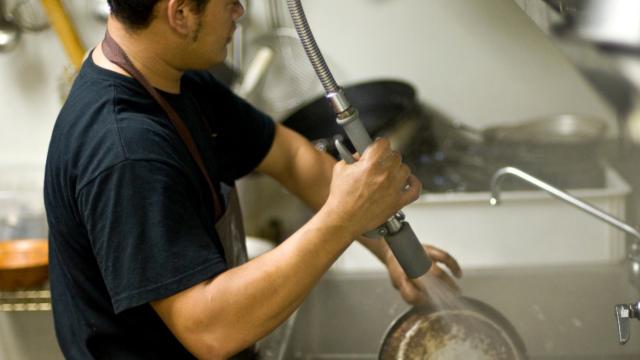There are many opportunities for commercial kitchens to increase energy efficiency and save money. One area that's often overlooked is pre-rinsing dishes before they are placed in the dishwasher.
Conventional pre-rinse spray valves (PRSVs) consume up to one-third of the water used in a commercial kitchen, according to the U.S. Environmental Protection Agency (EPA). The EPA estimates nearly one million food service establishments throughout the country use 53 billion gallons of water every year to rinse dishes.
Many commercial kitchens still use valves with flow rates far exceeding the current federal standard maximum of 1.6 gallons per minute (gpm). By replacing older models with those meeting federal standards, you can save significantly on water and energy costs. In one case, switching to a 1.6-gpm valve resulted in an annual savings of about $400 per sprayer for water, sewer and energy costs.
Save Even More
The EPA's WaterSense label sets the maximum flow rate for PRSVs at 1.28 gpm, or 20% less than the federal standard. Other requirements for the WaterSense label include:
• Life-cycle testing to ensure performance in commercial kitchens
• Spray force data must be listed on product packaging or in literature
• Independently certified to ensure efficient cleaning while using less water
Replacing just one conventional fixture with a WaterSense labeled model can save a typical foodservice facility more than 7,000 gallons of water per year, the amount of water needed to wash nearly 5,000 racks of dishes. The payback for replacing one fixture is just five to eight months.
Low-flow Valves Make a Splash at Pizza Restaurant
Boston Pizza replaced its conventional valves with low-flow models at one of nine locations for annual energy and water cost savings of $1,060. Average annual savings per valve was about 1,000 kilowatt hours (kWh) of electricity and 7,000 gallons of water.
September 2022 Connections Newsletter
From industry trends and best practices to sustainability initiatives, our monthly Connections Newsletter provides valuable insights, updates, and resources to support our large business customers.
